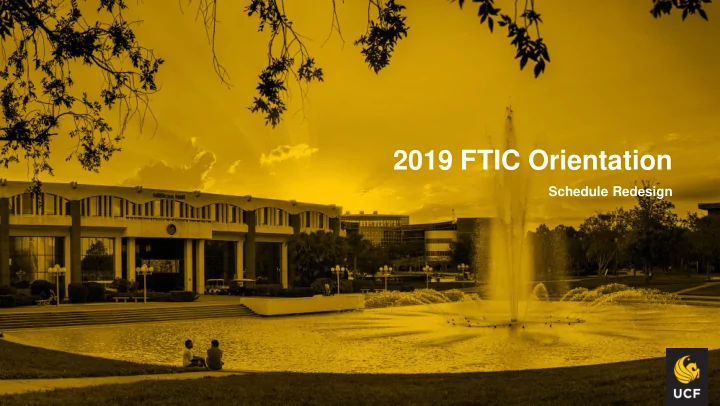

2019 FTIC Orientation Schedule Redesign
Outline for Today I. Why are we here? II. Approach and research III. Framework and goals IV. Finalized schedule V. Next Steps
Why are we here? Reimagining University Advising and Coaching (RUAC) • A review and redesign of the FTIC orientation program for implementation for summer/fall 2019 Orientation season • RUAC FTIC Orientation Redesign Team • Faculty, staff, and advising representatives
Approach and research • Prior Orientation assessment results • Campus-wide feedback surveys • National Standards • The Association of Orientation, Transition, and Retention (NODA) • Council for the Advancement of Standards in Higher Education (CAS) • Research • Benchmarking • Realities of UCF and the Orientation program
Approach and research Council for the Advancement of Standards in Higher Education (CAS) 2018 Contextual Statement for Orientation Programs highlights: • Facilitate academic and social integration; create a sense of belonging (Tinto, 1992, 2017; Pascarella & Terenzini, 1983; Pergio & Upcraft, 1989) • Provide opportunities for new students to learn about their academic opportunities, expectations, and support services; establish positive connection between academic advisors and new students • Supporting the parents, partners, guardians of the new student
First Year Experience and Orientation is committed to the informing, inspiring, and empowering students and their guests during the Orientation experience.
Informing, Inspiring, Empowering • Informing requires us to think of Orientation as a process • Inspiring students to care of about becoming UCF Knights and what it means to start their academic journey • Empowering students to take action and be responsible for their experience as Knights: academically, socially, and personally
Learning Outcomes Student Guest • Know UCF’s academic • Know they play a supportive role in their student’s transition expectations and their responsibility for their own process. experience. • Know UCF’s academic • Be aware of UCF’s social expectations and their student’s expectations and community responsibility for their own standards. experience. • Be aware of UCF’s opportunities • Know it is their student’s for engagement. responsibility to make decisions and take actions. • Know they have a responsibility • Know there are resources to for their decisions and actions. support students.
Goals 1. Orientation as a process 2. Intentional content 3. Holistic, themed sessions
Goals 1. Orientation as a process Pre-Orientation Post-Orientation Orientation Event Communication Communication (Just-in-time (E-mail, Webcourse, (Webcourse, E-mail, Information) Website, etc.) Website, etc.)
Goals 2. Intentional content
Goals 3. Holistic, themed sessions
Questions?
Finalized Schedule • Consultations • Took a closer look at realties • Considered University priorities • Student success technologies • Retention metrics • 4-year Graduation metrics • Students are responsible for their experience
Finalized Schedule • Two-day Program • Day 1: acclimation to UCF expectations; introduction to academic information • Day 2: exploration of student support resources; focuses taking action through advising and course registration • “Personalized” feel: by giving attendees the ability to choose the information they want to hear in-person at Orientation • Students will have access to all information after Orientation via a Webcourse
Review 2019 FTIC Orientation Schedule
Questions?
Next Steps • Collaboration and communication • Campus Partner Updates website • Campus Partner Toolkit • Review, identify, and simplify – what is your “just -in- time” information? • March 1 , Submit top 5 pieces of “just -in- time,” information and if your have presentation, please provide contact if you have a fluent Spanish-speaking staff member • Review the core messages to integrate in Orientation; more to come on this!
Next Steps • More information to come regarding Orientation involvement outside of presentations • Orientation Presentations • Content Meetings (February 25 – March 29) • Presentation title, descriptor, and learning outcomes due April 12 • Presentations due May 1 , utilizing Orientation template, or by April 26 if you are unable to have it translated to Spanish
Questions?
Recommend
More recommend